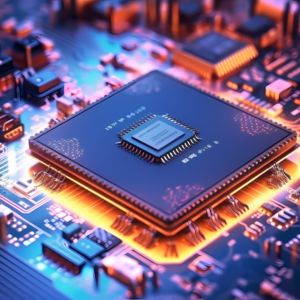Introduction: i7 vs i9 Processors for Gaming

In the world of gaming, selecting the right processor can significantly impact performance and overall gaming experience. Intel’s i7 and i9 processors are both renowned for their high performance and efficiency. But understanding the differences between them is essential for making an informed decision. In this detailed analysis, we’ll explore the intricacies of i7 vs i9 processors for gaming. We will compare their specifications, real-world performance, and considerations to help gamers choose the optimal option for gaming.
i7 vs i9 Processors for Gaming: An understanding
Intel’s Core i7 and i9 processors are part of the company’s premium CPU lineup, targeting gamers, content creators, and power users. While both series offer exceptional performance, they cater to different segments of the market with varying specifications and price points.
Intel Core i7:
The i7 series strikes a balance between performance and affordability, making it a popular choice among gamers and enthusiasts. These processors typically feature high core counts, robust multi-threading capabilities, and ample cache sizes. This helps deliver smooth gaming experiences and multitasking without breaking the bank.
Intel Core i9:
The i9 series represents the pinnacle of Intel’s consumer-grade CPU lineup. It offers unparalleled performance for demanding tasks such as gaming, content creation, and productivity. i9 processors boast higher core counts, increased cache sizes, and advanced overclocking capabilities. This provides gamers with the ultimate power and performance for immersive gaming experiences.
Specification Comparison: i7 vs i9 Processors

Now, let’s delve into the key specifications of i7 and i9 processors for gaming:
1. Core Count and Threads:
– i7 Processor: i7 processors typically feature fewer cores and threads compared to their i9 counterparts. However, they still offer ample processing power for gaming and multitasking, with quad-core and octa-core configurations being common.
– i9 Processor: i9 processors come with higher core counts and multithreading capabilities, ranging from octa-core to deca-core and beyond. This increased core count allows for smoother multitasking and improved performance in CPU-intensive gaming scenarios.
2. Clock Speed:
– i7 Processor: i7 processors generally offer high base and boost clock speeds. This ensures snappy performance in single-threaded tasks and gaming applications. Turbo Boost technology further enhances clock speeds for increased performance when needed.
– i9 Processor: i9 processors boast even higher base and boost clock speeds compared to i7 processors. This delivers exceptional performance across a wide range of gaming and productivity tasks. With higher clock speeds, i9 processors excel in demanding gaming scenarios and content creation workflows.
3. Cache Size:
– i7 Processor: i7 processors typically come with generous cache sizes, including L1, L2, and L3 caches, which contribute to improved data access and processing speeds. The cache size varies depending on the specific model and generation of the processor.
– i9 Processor: i9 processors feature larger cache sizes compared to i7 processors, providing faster access to frequently used data and instructions. This larger cache size contributes to smoother gaming performance and faster application loading times.
4. Integrated Graphics:
– i7 Processor: Some i7 processors come with integrated graphics. This allows basic gaming and multimedia tasks without the need for a dedicated graphics card. While suitable for casual gaming, integrated graphics may not provide the performance required for high-end gaming experiences.
– i9 Processor: Most i9 processors do not include integrated graphics. They are designed for enthusiasts who typically use dedicated graphics cards for gaming and content creation. This allows for greater customization and flexibility in building gaming rigs tailored to specific performance requirements.
Real-World Performance and Considerations: i7 vs i9 gaming processors
Beyond specifications, several real-world factors influence the performance of i7 vs i9 processors in gaming scenarios:
1. Gaming Resolution and Settings:
– i7 Processor: i7 processors offer excellent gaming performance at lower resolutions (e.g., 1080p) and moderate graphics settings. While capable of handling modern gaming titles with ease, they may exhibit slight performance limitations in CPU-intensive games or at higher resolutions.
– i9 Processor: i9 processors excel in delivering smooth gaming experiences at high resolutions (e.g., 1440p or 4K) and ultra-settings. With their higher core counts and clock speeds, i9 processors provide the necessary horsepower to handle demanding games and graphics-intensive workloads without compromise.
2. Multitasking and Content Creation:
– i7 Processor: i7 processors are well-suited for multitasking and content creation tasks, thanks to their robust performance and multi-threading capabilities. While capable of handling simultaneous gaming and productivity applications, they may experience performance bottlenecks under heavy workloads.
– i9 Processor: i9 processors shine in multitasking and content creation scenarios, offering exceptional performance for tasks such as video editing, 3D rendering, and live streaming. Their higher core counts and multithreading capabilities ensure smooth performance even under the most demanding workloads.
3. Overclocking Potential:
– i7 Processor: Many i7 processors offer overclocking capabilities. This allows users to push the CPU beyond its stock speeds for increased performance. While overclocking can yield significant performance gains, it requires careful monitoring of temperatures and voltages to avoid instability and hardware damage.
– i9 Processor: i9 processors are designed with overclocking enthusiasts in mind. They offer advanced overclocking features and unlocked multipliers for fine-tuning performance. With proper cooling solutions and overclocking expertise, i9 processors can deliver even higher levels of performance for gaming and productivity tasks.
4. Future-Proofing and Longevity:
– i7 Processor: i7 processors provide a balance of performance and affordability. This makes them a solid choice for gamers looking for excellent performance without breaking the bank. While they may not offer the same level of future-proofing as i9 processors, they still provide ample performance for current and upcoming gaming titles.
– i9 Processor: i9 processors represent a premium option for gamers seeking the ultimate performance and longevity. With their high core counts, advanced features, and overclocking capabilities, i9 processors offer unmatched performance for years to come. They are truly ideal for enthusiasts and power users.
Conclusion: i7 vs i9 processors for gaming

In conclusion, i7 vs i9 processors for gaming depends on individual preferences, budget constraints, and performance requirements. i7 processors offer excellent performance and value for gamers seeking a balance of performance and affordability. On the other hand, i9 processors provide unparalleled power and performance for enthusiasts and professionals who demand the best.
Whether you’re a casual gamer, competitive esports player, or content creator, Intel’s i7 and i9 processors offer a range of options to suit your gaming needs. By considering factors such as core count, clock speed, cache size, real-world performance, and future-proofing, gamers can make an informed decision and choose the processor that best aligns with their gaming goals and aspirations.
